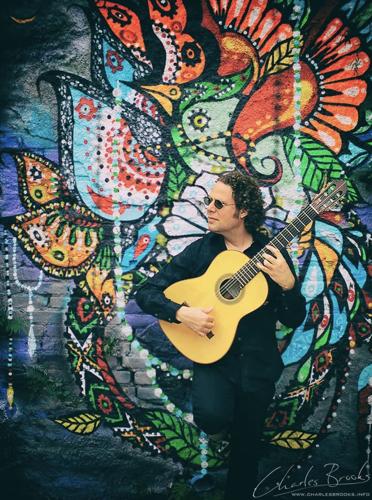Israeli flamenco guitarist Adam del Monte kind of stumbled into the conversation with his then girlfriend/now wife, pianist Mercedes Juan Musotto.
They were living in Spain, one of the stopping points in his flamenco guitar education — he also studied in his native Israel and England — and had performed in an opera that included a flamenco scene.
Out of nowhere, Musotto asked him if he had ever considered composing a flamenco opera.
He’d written a pair of flamenco guitar concertos, so he was familiar with writing for orchestra, but an opera?
Well naturally, he lied, and told her of course he had considered it, he recalled.
“She gave me that look where I felt that if I said no it would not be a very nice idea,” said the 52-year-old, who has taught guitar at the University of Southern California for nearly 20 years. “So I said, ‘yeah’ and I improvised very quickly a synopsis” centered on Sephardic Jews from Spain.
As he laid out the scenario, she chimed in with questions. He answered. She had more questions. He kept answering, and before he knew it he had unwittingly committed himself to making history.
“At that moment, little did I know that my life changed,” said del Monte.
On Jan. 30, in what is being billed as one of the highlights of the 2019 Tucson Desert Song Festival, del Monte will join a cast of three vocalists, two flamenco singers and his wife to perform the premiere of the first-ever flamenco opera.
The performance of “Llantos 1492,” presented by the University of Arizona Fred Fox School of Music and the Tucson Guitar Society, will be a guitar and piano reduction of the score.
“We managed to squeeze out 80 percent of the opera that’s going to be performed. It’s the entire opera minus two and a half scenes,” which del Monte said will be fleshed out with a narrator filling in the missing holes of the story.
The libretto, which del Monte also wrote, was inspired by a two- or three-sentence anecdote from a book he read 20 years ago about Spain’s Sephardic Jews. The anecdote recounted a Jewish lawyer going to the aid of a tribe of Gypsies facing a blood libel decree put on them during the inquisition. The lawyer was able to reduce the Gypsies’ sentences.
In del Monte’s recasting of the idea, the Gypsies wander into the garden of a nobleman, who loses his ever loving mind and has them arrested on charges they destroyed his beautiful garden. The nobelman’s wife, who doesn’t really like her husband, reaches out to a Jewish lawyer to help the Gypsies; no one else was real eager to take on her evil husband. The story then follows a plot to deceive the court, trick the nobleman and give justice to the Gypsies.
Del Monte’s biggest hurdle in the writing/composing, which took two years to complete: Having no examples to follow.
“I had no model. Of course I observed, I listened. I have been involved in orchestra my whole life. I have listened to a lot of opera,” he said. “On an intuitive level, I had an idea of what it was supposed to be, the dialogue and the back and forth, but not through a flamenco filter. How do I cram all this traditional stuff that’s very, very tried and tested through a new spectrum?”
“Classical music, rhythmically speaking, is much more simple and basic than flamenco,” he added. “Flamenco, rhythmically, is much more advanced.”
The Tucson performance is the only one announced for the opera, although del Monte would love to one day see it fully staged.





